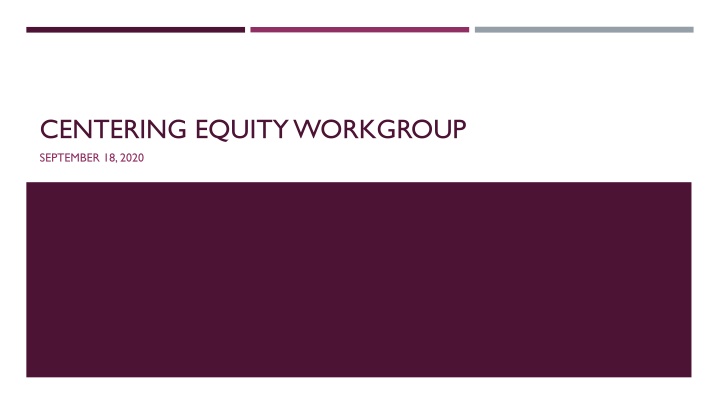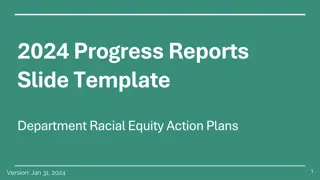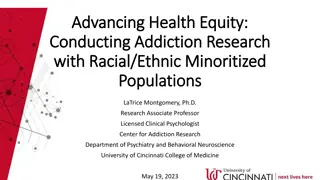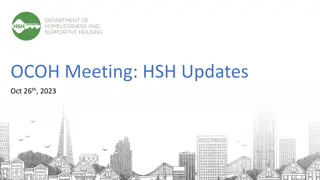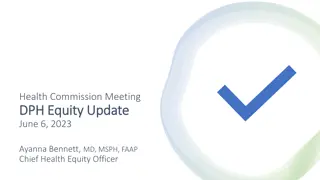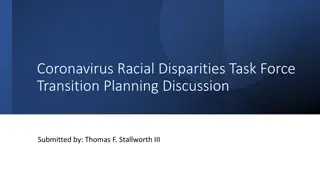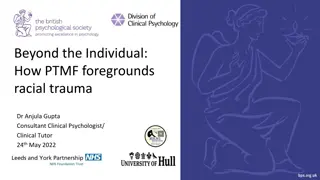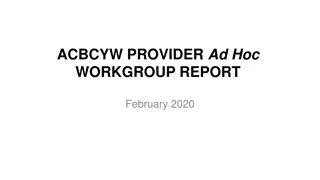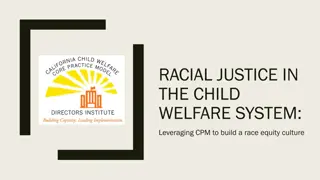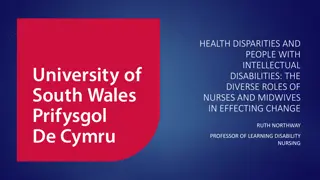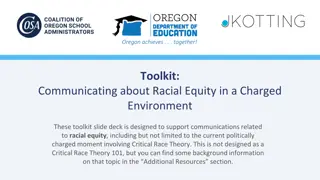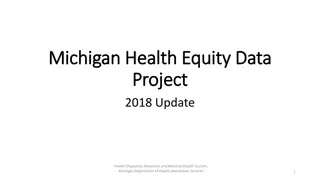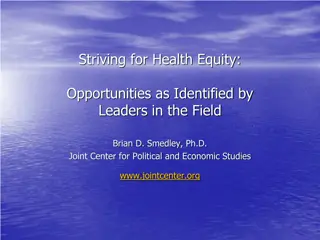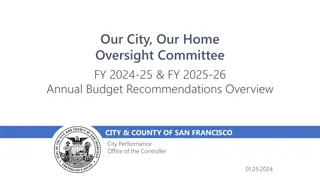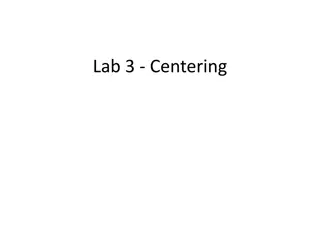Centering Equity Workgroup Recommendations for Addressing Racial Health Disparities
The Centering Equity Workgroup focuses on addressing racial health disparities, particularly during the COVID-19 pandemic. Recommendations include identifying root causes, implementing policies to combat systemic racism, and advocating for changes in Michigan law. Accomplishments involve strengthening institutional strategies and promoting equity impact assessments. Focus areas encompass maternal and infant health, equity impact assessments, and recognizing racism as a public health crisis. Specific goals and recommendations aim to diversify healthcare providers, standardize social determinants of health screening, and institutionalize tools for racial equity impact assessments with adequate support and evaluation processes.
Download Presentation

Please find below an Image/Link to download the presentation.
The content on the website is provided AS IS for your information and personal use only. It may not be sold, licensed, or shared on other websites without obtaining consent from the author.If you encounter any issues during the download, it is possible that the publisher has removed the file from their server.
You are allowed to download the files provided on this website for personal or commercial use, subject to the condition that they are used lawfully. All files are the property of their respective owners.
The content on the website is provided AS IS for your information and personal use only. It may not be sold, licensed, or shared on other websites without obtaining consent from the author.
E N D
Presentation Transcript
CENTERING EQUITY WORKGROUP SEPTEMBER 18, 2020
EMPHASIS OF RECOMMENDATIONS: Addressing The Root Cause Of Racial Health Disparities How to put in place policies, programs, and practices that contribute to the ending of systemic racism Pragmatic Study the causes of racial disparities in the impact of COVID-19 and recommend actions to address such disparities Identify other issues and provide recommendations to the governor on any other matters relevant to addressing racial disparities in the impact of and response to pandemics. MI Task Force on Racial Disparities Recommend changes in Michigan law relevant to combatting racial disparities in the impact of and response to pandemics.
CENTERING EQUITY ACCOMPLISHMENTS Strengthened MDHHS plan on institutionalizing the Equity Impact Assessment model across the agency, as it relates to ED: 2020-9. Informed recommendations to LARA in response to ED: 2020-7, which requires all health care professionals to receive implicit bias training for licensure and relicensure. Galvanized and promoted the Coronavirus Rapid Response Funding Initiative. Coordinated with MDHHS DEI Council, MDHHS Opioids Team and the Racial Disparities Centering Equity Workgroup to gather and submit recommendations on how to tangibly address racism as a public health crisis.
ADDRESSING RACIAL HEALTH DISPARITIES DURING COVID-19 CENTERING EQUITY FOCUS AREAS: Maternal Infant Health 1. Equity Impact Assessment 2. Racism as a Public Health Crisis 3.
FOCUS AREA: MATERNAL INFANT HEALTH Goal: Identify opportunities to advocate for more focus and resources to move forward a cross- sector systems change model to end systemic racism. Recommendations: Diversify the pool of birth professionals who are considered official health providers for healthcare coverage including lactation consultants, doulas, midwives, CHWs, medical interpreters, etc. Create a policy to create uniformity and standardization of SDOH screening across the healthcare system.
FOCUS AREA: IDENTIFY BEST PRACTICES FOR RACIAL EQUITY IMPACT ASSESSMENTS Goal: Develop or amend policies or practices to assure that all are responsive to root causes of health disparities and inequality. Recommendations Institutionalizing the EIA tool must come with capacity building, professional development, training, ongoing technical assistance, resources, and organizational change. Make an explicit, committed, and sustainable line in budget to support the work. Establish process evaluation as learning and accountability. Reporting around implementation.
FOCUS AREA: RACISM AS A PUBLIC HEALTH CRISIS Goal: Provide guidance from the state on actions that can be associated with declarations of racism as a public health crisis. Recommendations Understand and establish greater robustness around MDCR s discrimination complaint process. How do we compliment regulation with knowledge and needs assessment frameworks? Cultivate intentional and accessible process for ensuring that community voices are readily and easily incorporate.
